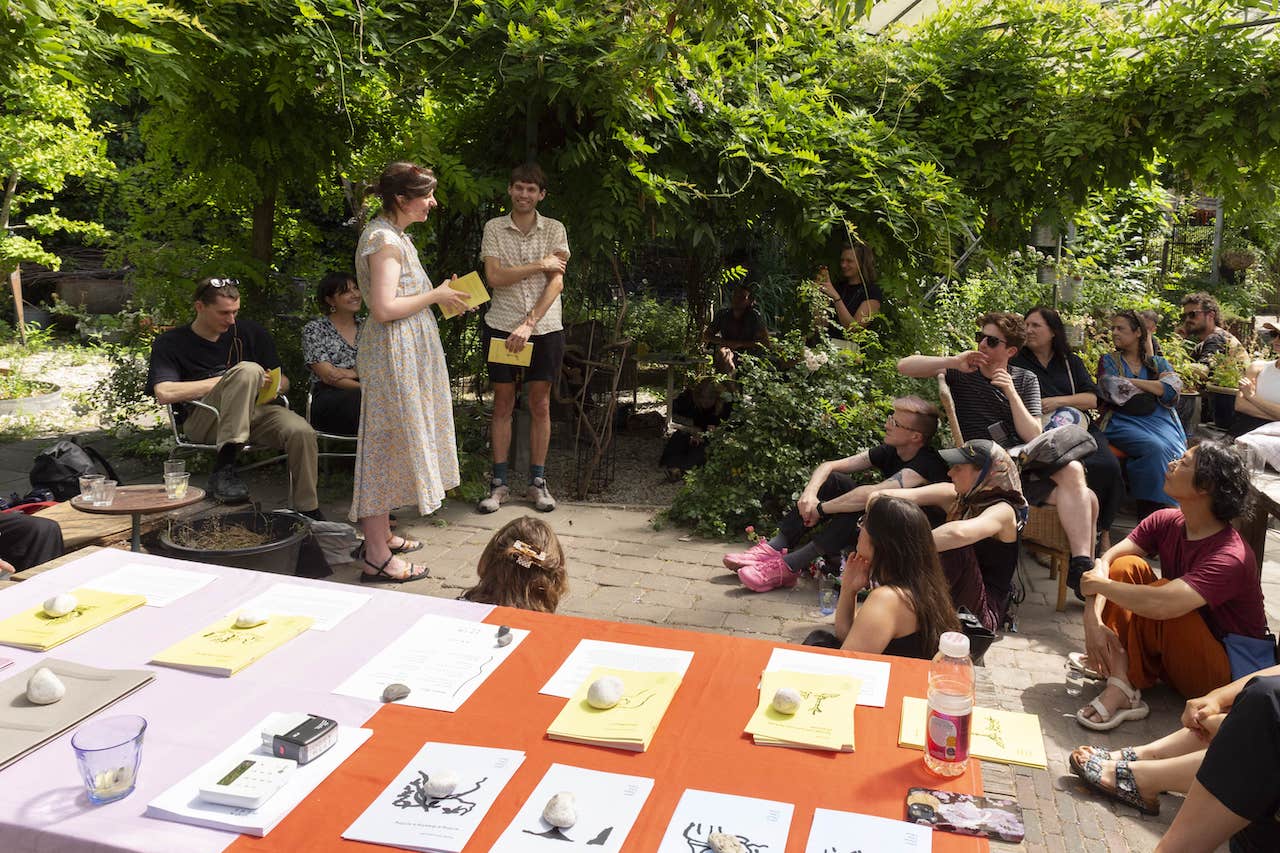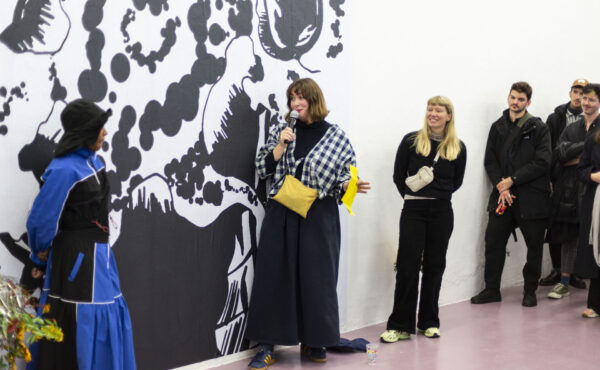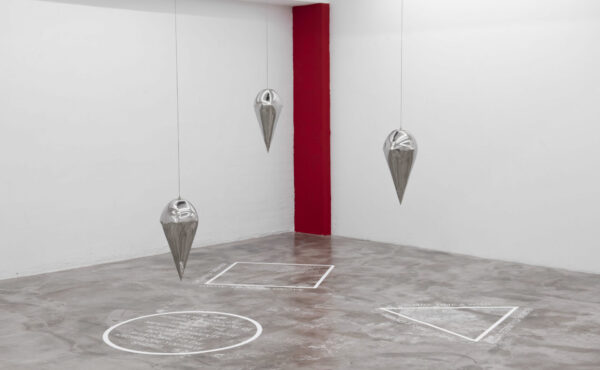
Kate Briggs, Linus Bonduelle, Annabelle Binnerts and Ash Kilmartin at SPTM! Pamphlet Launch, January 2023
‘There’s text happening everywhere’ – in conversation with writing and publishing collective Short Pieces That Move!
First begun in the context of the Piet Zwart Fine Art Masters by writer and translator Kate Briggs, Short Pieces That Move! has since expanded beyond the institution into online writing sessions, and more recently a publishing project. Cara Farnan sits down with the group a few days before their second pamphlet launch to ask about the work that they have been doing and the collective and energetic nature of their editing and publishing processes.
Back in April, tea in hand, I sat down to my laptop and joined an online writing session with Short Pieces That Move!. Hosted on a rise-up pad, no cameras in sight, a chorus of names and colours threw out words; we read, interjected, wrote sentences, borrowed words from others, rewrote sentences. I was met with this same playful energy of reading, responding, writing in bursts, then borrowing and rewriting when I joined an in person workshop hosted by the collective at the Van Abbehuis in Eindhoven a few months later.
Initiated by long time group members Annabelle Binnerts, Ash Kilmartin, Linus Bonduelle and Petter Dahlström Persson, SPTM! has recently started a publishing project as well, founded on the principles that publishing is possible and that editing, design, printing and making public all present further occasions for co-learning. The group published its first run of four pamphlets by Katerina Zdjelar, Vasiliki Sifostratoudaki, Annabelle Binnerts and Niels Bekkema back in January 2023, followed by another four in July by Xiaofeini Liu & Kate Price, Kate Moss, Ash Kilmartin and Jake Caleb.
Kate, I wonder if you could start by introducing Short Pieces That Move!, and talk a little bit about how the writing group side of it began within the Fine Art Masters at Piet Zwart?

SPTM! Pamphlet Launch, January 2023
‘For a long time, I was a writing tutor on the Masters in Fine Art at the Piet Zwart Institute, where my primary role was to support thesis writing. But I was always noticing that a lot of the writing activity that was happening in the studios was directed more towards the practises than towards this thesis component. I had this sense that it would be great to make a time and an occasion to attend to this writing action that felt separate from what the thesis needed to be. It also came about from my own enthusiasm and desire to push my own writing, and to play and experiment. The group was called Short Pieces That Move! from the very beginning. I had just bought this Penguin Anthology of the Prose Poem, edited by Jeremy Noel-Todd. There is some great work in there and in most cases it is very short, achieving its major effects in just a paragraph or a couple of lines. So the first proposition within the context of the MFA was to read a short piece of writing written by someone else and ask “how is it working?”, “how is it moving?”, “what is it doing to us as readers, how is it generating these effects?”. It’s quite classical creative writing pedagogy in a way. Our next question was: “then how do we authorise ourselves to write with the move we’ve just identified and test it for ourselves?”’.
Kate Briggs: ‘We moved what was an in-person workshop onto a rise up writing pad and invited not only people within the MFA, but also former students and anyone really who wanted to join’
When did SPTM! start to leave the specific context of the Piet Zwart Masters in Fine Arts?
‘It began this way within the Masters, but the transformative moment was when Covid happened. We were all on lockdown, so Short Pieces became this way to generate a community moment. We moved what was an in-person workshop onto a rise up writing pad and invited not only people within the MFA, but also former students and anyone really who wanted to join to come and meet every Sunday afternoon, to read something together and then write together. That transformed the format and for me, it was striking to see how the online version was working in a really different and really exciting way. There’s a quietness and a privacy to working online; also, it means that whatever we write, type into the pad and share, immediately becomes both readable, for everyone, and ‘usable’ – it is immediately material that anyone present can work with, whether they’ve written it themselves or not. That ethos of sharing and learning from each other’s very new writing has become the core of the project. Also at that point I realised how much I was getting from these sessions and how much I was learning from the other participants. It didn’t feel like it was just me instructing everyone else. It was more like making an occasion for my own learning, and it’s been so generative for my own writing.’
How did these online sessions translate into what you have now, the publishing initiative? Was there a particular desire or energy that you noticed within the group that led you there?
‘I’ve always personally had an interest in printed matter and in a kind of doing-it-myself version of publishing. What it is to fold a piece of A4 paper in half and discover that you have something like the beginning of a book. It’s been important to me to feel that I can offset other forms of publishing with something that’s really local and self-generated. The work that’s produced in the writing sessions is fragile because it’s only just appeared, it’s only just been written. I find that really exciting; to go from nothing to something. There was a desire, from me, but also within some of the most invested participants in the group, to take some of this writing that had been produced spontaneously, in response to my on-the-spot prompts or suggestions, and attend to it for a bit longer. And this way to open up another path of inquiry and of learning – about editing, and how to do this well, about supporting someone else’s writing project, about helping them understand and realise their intentions. The publishing part really runs on its own track, the writers involved haven’t necessarily participated in the pad sessions. It’s more like opening up an occasion for an editorial conversation with someone who doesn’t necessarily identify as a writer as their primary practice, but has a curiosity about pushing at something that they might have already been working on, for a range of different reasons. The main criteria are that it is short and – ongoingly – that it moves. We’re still – always – very interested in the rhetorics of writing, and how these “moves” might scale up or down, get translated and set to work in new contexts.’
‘There was also an intermediary point between the writing session, and the collective forming to make the pamphlets, which were the two previous publications which came from the pads. The second of those was almost a direct print-from-PDF record of what happened on the pad in a given number of sessions. I think that it really shows the impulse in a direct way: we have this online moment of making where we go from nothing and then suddenly there is a lot of something. Then going from that to being able to hold it in your hands and say, this is actually really something. I think that was an important step between the writing workshops and then this publishing part being formed.’

SPTM! Pamphlet Launch, January 2023
‘Yeah, for the first publication, when SPTM! was still a part of the Masters curriculum, the participants at the time, all students, could send in pieces that were written during the workshops or as a direct result of those workshops. The nice thing was that some of them were typed out, others were written on paper, so you have this mix of pieces coming together as one bundle. For me that was also the moment where I felt “ publishing is possible!”. Whatever we write, we can take it seriously, put it in a book,launch that book and give that book to the world. I think that this first energy, at least for me, carried over to the next publications. That has always been a big energy in the room with Short Pieces which even led to me publishing my own first book of poems.’
Ash Kilmartin: ‘I’m a huge fan of picking up pieces of paper that people have dropped on the street. Strangers’ shopping lists are a gold mine for me’
I noticed from my experience joining both your workshop in the Albert Van Abbehuis, and the online pad sessions, that we were really encouraged to share words and ideas with each other. Doing it with other people really gave me freedom to just write without overthinking and when I felt stuck, I could just leap off from where someone else had started. I can imagine that deciding to publish something by yourself is a little scary, but that this collective energy of sharing it, and not being alone in the process makes it feel more manageable. Could you talk a little bit about how the ethos of the writing sessions has influenced the way you work together on the editing and publishing?
‘There’s a levity to the pad sessions that gives so much permission, like the permission to be silly and to see that being silly can produce something that’s worth taking seriously. That is an energy that I really treasure. It doesn’t have to be good right away, it doesn’t have to be serious right away, you just have to do it. That’s a really important lesson. When it comes to collectively editing we have that openness to play and to experiment. We take turns to edit based on an affinity with a given text or practise, but we can always look around and ask each other, “what do you think about this?” or: “Am I doing too much to this text or am I helping it become more itself?” As a collective, I think that that functions really well.’
‘The second publication we made was basically a print out of all the sessions that had taken place up until that point. As a title, we chose a sentence that came from the pad directly: ‘yes, we produce text just by existing’, which I think is a really nice way of summing up what’s happening in the sessions. It refers to the fact that there’s just text being generated in there all the time, there’s text happening everywhere, you can just pick something from it and not all of the writing has to be produced by yourself. When I first started joining the sessions, I was quite new to writing, and I had always, kind of mistakenly, thought of writing as being a very solitary experience; something that happens when you’re on your own, behind a desk. I think both in the sessions, but also in the process of editing I really enjoy the collectiveness of it…
How did you enjoy the experience of having your own pamphlet edited, Annabelle?
‘I really enjoyed it. Writing is present in my own practice quite a lot, but I had never had the opportunity to ask for edits… So the process of working on the pamphlet for SPTM, for instance the way in which we worked on the selection of texts, was so extremely helpful, not only for the final text in the pamphlet, but also for the way I think about my writing in general. My work often focuses on the interaction of a viewer/reader with my writing, and almost always finds its place in the space of an exhibition. But working on the pamphlet made me think of how my writing relates to the space of an A5, instead of an exhibition space, and of how this changes the dynamic with a reader as well.’
‘When we were editing your pamphlet, Annabelle, I was surprised and it taught me a lot to see how open you were to our suggestions. I think that as artists who write or artists who use text, as you say, we seldom have the opportunity to be edited. To have somebody take seriously what you’ve written and try in good faith, wanting the best for the text, to show you something different about it, that doesn’t happen very often. The expectation generally is that it comes from you alone, directly, and then it’s out in the world. Receiving critical feedback is rare, and therefore can be scary. And so I really enjoyed us printing out all of Annabelle’s texts and pages and putting them on the table and saying,’what happens if we just take this out completely?’, ‘what happens if we shift the order of these?’ And Annabelle was so receptive to seeing how the text changed in the process turning it into a book. There is a trust that a writer gives to you as an editor, that you’re agreeing to enter this process together.’
I love what you have said about text happening everywhere. I wonder if any of you have experiences of encountering text outside of reading or outside of books that have stuck with you?
‘I often go to this movement class, for amateur as well as professional dancers, all bodies. And it’s regularly animated by this amazing choreographer called Marjon, who does it in a very specific way: she guides the class from lying on the floor to standing to really dancing. During a recent class she said something into her mic like, “it takes strength to be this soft”. And on the way home, I wrote this down. “It takes strength to be this soft.” I thought, oh, Ash would love that line! Like, that’s something to work with, that’s a bit of found language to work with – what does it mean, even? I think the language that has the capacity to present as material to me is often just in the world. These found phrases, or overheard snatches of conversation; lines that somehow just enter my space and then for some reason I need to note them. The pad sessions do this for me, too, but in an even more intensive way: they are like two-hour bursts of innovative language usage, with all these users of English working with it in such novel, unexpected ways.’

SPTM! Pamphlet Launch, January 2023
‘Yes absolutely, it’s like finding language in the world that doesn’t think of itself as being written. I’m a huge fan of picking up pieces of paper that people have dropped on the street. Strangers’ shopping lists are a gold mine for me. This insight into feeling and need and function in other people’s lives. That’s what found language is and does for me. That’s what I love about it.’
Linus Bonduelle: ‘Inventing your own structures and systems of validating and publishing, like self-publishing, is very punk. It’s not waiting for an agent, it’s just like: I want to get this out in the world, here’s how it’s possible’
Annabelle, you have said that before Short Pieces That Move! you were quite new to writing, and Linus, you mentioned that throughout the process you began to publish your poetry. As people who, maybe write, but wouldn’t have considered yourselves writers, or for whom writing was not the main output of your practice, what have you learned and gained through your involvement with this project? And is there any advice that you could offer to other ‘non-writers’ who write, but aren’t sure what to do with what they write?
‘When I started at the Piet Zwart, I wasn’t even a non-writer who wrote. I was a non-writer who did a lot of reading, but no writing at all. I did already incorporate text in my work, but it was always borrowed and quoted from others. I think the most important thing the Short Pieces sessions did for me was lowering the threshold, starting something, putting words on paper, just to have something to work with and work around. I’m still not a writer who uses a lot of words, I’m quite sparse in my writing. Oftentimes I’m just working on one single sentence, and writing it over and over again in different ways, editing it continuously.’
‘I think what I have learned, and what could be advice to people who are writing, but not publishing, would be to just show it to people and get it out. Show it to a publisher and say, “do you want to publish this?” That’s how I got my first book out, because someone just reacted enormously enthusiastically. But also show it to friends, as we have done in Short Pieces. We have been editors to each other and loving readers and commentators and analysts to each other all the time. You don’t need a professional editor, of course it’s nice to have someone who completely understands all the grammatical rules, but I think anybody whose opinion you respect, you can just ask them to have a look at what you did.’
‘I think that one of the deep motivations for me to start doing this was the fact that it took me quite a long time to start writing creatively. I don’t remember any tutor when I was a student sitting me down and saying, “hey Kate, you know, you can do this, this literary sphere that you’re so into as a reader, you can do it, too”. I don’t remember anyone making that clear to me, so teaching has been a way to sort of create these spaces of permission-giving and threshold-lowering for others and, also, indirectly, for myself. For example, there’s this practice called poetry and it can seem like you need to be given keys to the castle, to be granted access. But you know, there’s actually nothing more mysterious about it than starting. I mean, obviously, once you start reading and writing poetry, many more questions and problems will come in – a lot of learning will happen! But the first step is just to start. I think we share this ethos of publishing being both possible and consequential – even micro publishing, at the small scale of the pamphlets, our 200 copy print run. The pamphlets we’ve produced are now things that are circulating in the world and are acting in the world, they are being read, they are sitting alongside the practices of those who wrote them. I really believe it takes no more and no less than this: printing something in multiple. – It’s such a vital lesson: that writing can enter the world – without needing to go through a whole range of protocols and validation processes first. Which is not to say that those processes are not important, but you can create the context for that sort of rigour for yourself. Through friendship, through conversation, through peers. Invent a structure which doesn’t necessarily depend on existing institutional structures. I feel that’s partly what Short Pieces is doing, it’s saying: here’s a new structure through which work can pass and which operates on its own terms, and runs on its own energy.’
‘And that’s very punk. I think that’s in the true spirit of punk, you know, inventing your own structures and systems of validating and publishing, like self-publishing. It’s not waiting for an agent, or a publishing house to do a print run of 5000 copies. It’s just like: I want to get this out in the world, here’s how it’s possible.’
‘As an undergraduate in Aotearoa I worked in the art school library, and there I found so many treasures which were people’s self-published, small print run, homemade things. This is a structure that we made for ourselves, but it’s not new. There are so many great outlets and archives for self-published material, and some of them even have our pamphlets! These things really circulate. A small piece of A4 card with a few pages folded and stapled can make a really big impact to a reader that you’ve never met. Advice that I would give myself and other people who write but don’t know what to do with it, is: print it out. And put it somewhere, because you’ll find it again sometime in the future and it will mean something to you. It will do something to you. Print it out and then send it places, because it will strike people. You might not ever find out about it, but it does do that. It’s very effective.’
Short Pieces That Move! is a reading and writing group begun in 2018, in the context of the Masters Fine Art at the Piet Zwart Institute, Rotterdam. In 2022, five long-term SPTM! participants – Annabelle Binnerts, Linus Bonduelle, Kate Briggs, Ash Kilmartin and Petter Dahlström Persson – initiated a publishing project founded on the principles that publishing is possible and that editing, design, printing and making public all present further occasions for co-learning. The SPTM! collective works closely with new as well as experienced artists/writers to produce paired publications that speak to their different concerns while also contributing to our ongoing open-ended movement-inquiry. For more information see: https://shortpiecesthatmove.hotglue.me/ and:https://instagram.com/shortpiecesthatmove
Cara Farnan
is a visual artist and educator


